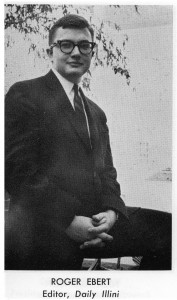
Roger Ebert, circa 1967. RS 26/4/1.
Zack Stein is a graduate student in Library and Information Science at the University of Illinois. He is currently completing a practicum at the Student Life and Culture Archives.
It has been nearly three years since the death of Roger Ebert. To most of us, he was one of the most famous film critics in history. He wrote weekly reviews for the Chicago Sun-Times, co-hosted a film review show with fellow Chicagoans Gene Siskel and Richard Roeper, and started his own film festival which has been held at the Virginia Theater in Champaign for the past 17 years. He also was the first film critic to win the Pulitzer Prize for Criticism. While film was his subject of expertise, his true drive and passion was his love affair with the written word. A voracious reader of science fiction and Henry James, Mr. Ebert knew from an early age that he wanted to be a writer. It was his time as the editor of the Daily Illini at the University of Illinois where he was able to exercise his writing to the fullest. It was also his abrasiveness that got him noticed and earned him the respect he deserved.
Starting in 1962, Mr. Ebert contributed a regular column for the Daily Illini. It was titled “Ars Gratia…”, which is Latin for “Art for the sake of…” An advertisement described the column as thus: “For a wide-ranging, sharp witted probe into the arts and communications – and the creeping conformism of American society – read “ARS GRATIA.” [1] The column encompassed a wide variety of subject matter including entertainment, politics, college life, and societal philosophy. In one particular column, Ebert opened the piece with a line from the Ingmar Bergman film The Magician, saying : “I have prayed just one prayer in my life: Use me.” [2] He uses this quote to emphasize the trend of conforming to materialism and security, and how big executives (“grey-haired men”) want to influence young recruits. What Ebert argues for in this piece can be seen as something of an introduction to his style: “For if our society cannot accept new ideas, criticism and handshaking…then it must truly be a house of cards.” [2] One can see his preference for the personal and empathetic subjective. As a writer, he felt it was necessary to see where he fit in society and give his readers an idea of what he was thinking. This may explain why his later film reviews would be written in the first person. While he considered himself a newspaperman, perhaps he did not consider himself a newsman, or someone who simply just reported and was impartial to opinion. While Mr. Ebert is certainly not the first columnist to write opinions, it was his empathy and reflections that appealed to readers. He once said that “We live in a box of space and time. Movies are windows in its walls. They allow us to enter other minds – not simply in the sense of identifying with the characters, although that is an important part of it, but by seeing the world as another person sees it.” [3] Overall, it seems it was his ability to express his empathy that stimulated his writing.

Roger Ebert as editor of the Daily Illini, 1964 Illio.
The first film review Mr. Ebert wrote for the Daily Illini was in 1961, his sophomore year. It was for an artistic Italian film called La Dolce Vita, directed by the great Federico Fellini. While he would later revisit this film in his “Great Movies” column in the Chicago Sun-Times, it is interesting to see his reaction to it as a college student. While admiring the film immensely, he only awarded it 3 out of 4 stars, and judged aspects of the film on whether American audiences would understand it or not. When discussing the final scene of the film, he states that “Its [the final scenes] message, of complete and final meaninglessness, might not come through to an audience which may not find such things particularly everyday.” [4] On later viewings, Mr. Ebert’s attitude towards the film went through a slight change: “Movies do not change, but their viewers do.” [5] The quote marks what was special about the way Mr. Ebert wrote and thought. It is easy to praise, dismiss, or judge something on first glance, but it takes much more willpower to really take the time to think about the experience. By taking multiple perspectives when possible, Ebert was able to evolve on certain ideas and analyze subjects on more than one level.
Even when moving to the city to work for the Chicago Sun-Times, Mr. Ebert in many ways never left Champaign-Urbana. In 1999, he founded a film festival that focused on overlooked films. It is a week-long festival held at the Virginia Theater in Champaign every April. Mr. Ebert, several of his colleagues, and celebrities would attend this festival and participate in a Q&A afterwards. When he was no longer able to speak due to the removal of his cancerous jaw, his wife Chaz took over as festival-runner. The festival includes not only films overlooked in a particular year, but also older films that were close to his heart. The festival continues to this day.
Although Mr. Ebert lost his ability to speak later in his life, he never lost his will to write. In addition to his regular schedule of film reviews, he also began writing a weekly blog, on subjects as varied as the ones he wrote about back in the 1960s for the Daily Illini. These subjects included politics, religion, film trends, and whatever else came to his mind. Just as Stephen King has the uncanny ability to release two or three strong books every year, it is as if writing is what kept Mr. Ebert’s spirits up. An archive of nearly every review, blog and essay he wrote is available on his website: rogerebert.com. In 2011, he released his memoir Life Itself. As the title suggests, it is a personal reflection on his life and his own perception of it. The documentary version was released in 2014, a year after his death. It was directed by Steve James, the same man who directed one of Mr. Ebert’s all time favorite films: Hoop Dreams. Here is a sample from his memoir of what he thought about writing: “When I write, I fall into the zone many writers, painters, musicians, athletes, and craftsmen of all sorts seem to share: In doing something I enjoy and am expert at, deliberate thought falls aside and it is all just there. I think of the next word no more than the composer thinks of the next note.” [6]

A statue of film critic Roger Ebert giving his trademark “thumbs up” gesture outside the Virginia Theater in Champaign, IL. Bordwall. 2 June 2015.
The last article that Roger Ebert wrote for “Ars Gratia…” was a column about some of his reflections regarding the Daily Illini and its significance as a college newspaper. He frequently lauds the newspapers penchant for “editorial freedom”, and for “putting together a daily mosaic of events, opinions and facts” that overall painted a portrait of the “confused but dynamic campus.” [7] This kind of reflection he would take to heart when transitioning to the Chicago Sun-Times, whether he was covering films or any other topic. While he may be gone, we will be seeing him at the movies for years and years to come.
[1] Advertisement for “Ars Gratia”, Daily Illini, 10 April 1962.
[2] Ebert, R. “Ars Gratia: Offer Security but Hope?” Daily Illini, 11 April 1962.
[3] Ebert, R. (2002). “Introduction.” The Great Movies. Broadway Books. New York, NY. Pg. xv.
[4] Ebert, R. “La Dolce Vita.” 4 October, 1961, www.rogerebert.com.
[5] Ebert, R. “La Dolce Vita.” 5 January 1997, www.rogerebert.com.
[6] Ebert, R. (2011). “Memory.” Life Itself. Grand Central Publishing. New York, NY. Pg. 4.
[7] Ebert, R. “Ars Gratia: Reflections.” Daily Illini, 22 April 1964.

